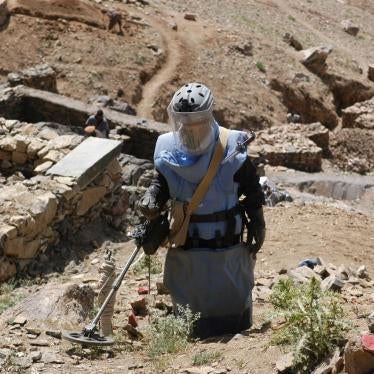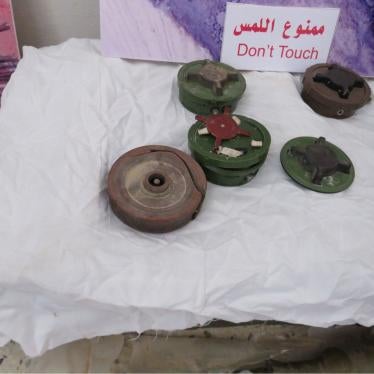The record of compliance with the Mine Ban Treaty by States Parties is praiseworthy, particularly with respect to the comprehensive bans on use, production, and trade.
But, there are serious compliance concerns, as States Parties recognized at the 2019 Review Conference and in the Oslo Action Plan. Most disturbing is Eritrea’s situation, where it remains in violation of the treaty by virtue of its failure to meet its clearance deadline, failure to submit an extension request, and failure to undertake any clearance operations. States Parties should consider invoking Article 8 to address this matter.
Overall, there are concerns with respect to Article 3 on mines inappropriately retained for training and research, Article 4 on missed stockpile destruction deadlines, Article 5 on delayed action or non-action on mine clearance, Article 7 on the low rate of transparency reporting, and Article 9 on lack of national implementation measures.
Let’s review what States Parties agreed to last November. In recognition that compliance issues extend beyond potential use by States Parties, the mandate of the Committee on Cooperative Compliance was expanded to explicitly include Articles 7 and 9, as well as “to also address all matters under Article 1.2 ….” Our understanding is that by invoking Article 1.2, the Committee now has responsibilities under Articles 3, 4, and 5 as well.
Moreover, in Action #49 of the Oslo Action Plan, the President is given a new role to play in ensuring compliance with Articles 3, 4, and 5. This has been described by some as an “early warning mechanism.” The action point states, “If no information on implementing the relevant obligations [of Articles 3, 4, or 5] for two consecutive years is provided, the President will assist and engage with the States Parties concerned….”
With the expansion of the roles of the President and the Committee on Cooperative Compliance, States Parties are in a much better position to deal with implementation and compliance concerns at an earlier stage and more effectively. Unfortunately, the President and the Committee have a lot of work to do and there has been little progress thus far.
With respect to Article 3, many States Parties are retaining mines under the Article 3 exception, but are not utilizing the mines for the permitted research and training purposes. As this continues to be the case year after year after year, it appears that the mines in fact are simply being stockpiled. As a matter of compliance, these states should either utilize the mines as permitted, or destroy them urgently.
A total of 48 States Parties have not consumed any retained mines or provided any updated information for at least two consecutive years. Eighteen States Parties have not consumed any retained mines for at least 10 years, and 7 States Parties have never reported consuming any mines retained for permitted purposes since the treaty entered into force for them.
With respect to Article 4, Greece and Ukraine remain in violation of the Treaty for their ongoing failure to complete the destruction of their stockpiles LONG after their deadlines. They have made little progress in recent years and neither has identified a completion date.
With respect to Article 5, there are at least three mine-affected States Parties that have not reported information on implementation of Article 5 in an Article 7 report for three or more years (Eritrea, Niger, and Nigeria). In addition, there are instances when State Parties have been granted mine clearance deadline extensions, but then undertaken little to no action to meet the new deadline. It would appear that such non-action or non-implementation is against the objectives and purposes of the Treaty, and should be addressed as a compliance matter. There are also situations (for example in Senegal) where little to no clearance has occurred around some military installations, raising the question of possible military benefit from the emplaced mines. Another compliance issue is the failure of some states to submit extension requests on time, as is the case with Eritrea, or to submit at all when faced with new contamination (as for Cameroon and Mali).
On Article 7, the level of compliance with the obligation to submit an annual transparency report has fallen to an embarrassing low of 40%, which the President has called unacceptable. Notably, some states with key outstanding obligations such as clearance are failing to submit. Twelve States Parties with clearance obligations have not submitted a report in 2021 covering 2020.
Similarly, too many States Parties have failed to enact appropriate national implementation measures as required by Article 9. There are more than 50 States Parties without national measures in place. The ICBL believes that new, stand-alone national legislation is the best way to meet the Article 9 requirement. Action #50 of the Oslo Action Plan calls on states to urgently undertake and report on national measures by the 20th Meeting of States Parties.
With respect to the Mine Ban Treaty norm, the global stigma is strong and has resulted in de facto compliance by most States not party. In recent years, only one government armed force is confirmed to have used antipersonnel mines—Myanmar. However, Landmine Monitor identifies use of antipersonnel mines, usually of an improvised nature, by non-state armed groups in at least five countries in late 2020 and 2021.
These various compliance concerns are not new. They are long-standing, and States Parties have wisely begun to develop new approaches to deal with them. The key now will be dedicated and sustained attention from the President, the Committee on Cooperative Compliance, and all States Parties.
Thank you.








